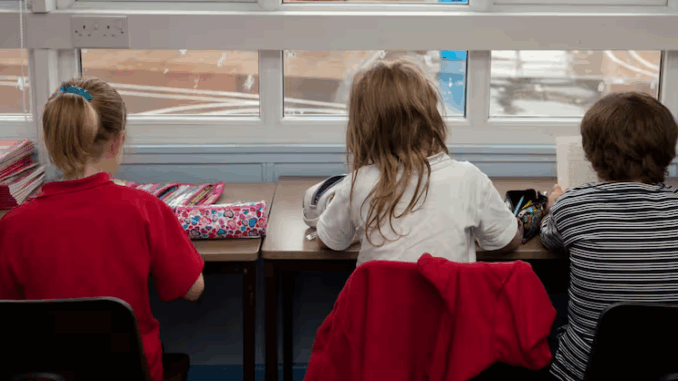The UK government has enacted a draconian ban on kids venturing outside during ‘deadly’ 26-degree heatwaves, forcing schools to confine children indoors for “hot play” breaks to avoid dangerously scorching playgrounds. This overreaching policy, portraying mild summer temperatures as lethal, underscores a nanny-state crackdown on outdoor freedom, leaving parents and critics fuming over the exaggerated risks.
Designed to shield pupils from sun-heated surfaces that can become painfully hot, the measure has teachers enforcing indoor confinement whenever playgrounds are judged unsafe. As heatwaves intensify scrutiny on child safety, the policy highlights growing concerns about balancing protection with the benefits of fresh air and play, prompting debates on whether such restrictions go too far in shielding kids from everyday weather.
Telegraph.co.uk reports: But the concept has been branded “absolute nonsense” by critics, who warned that it risked raising a generation of “wimps” taught to “hide from warm weather”.
‘Hot play’
Schools routinely hold “wet play” sessions when it rains, where children play indoors between lessons instead of going outside.
But “hot play”, which is the equivalent for heatwaves, appears to be a relatively new idea.
The practice has been highlighted by the WWF, the environmental group, which is calling for schools to use more natural surfaces, as opposed to artificial ones, to “mitigate the effects of extreme weather”.
Chris McGovern, a former head teacher and chairman of the Campaign for Real Education, warned that keeping pupils indoors during hot weather was the “worst thing” for them.
He said: “I taught for 35 years. Any teacher knows that the worst thing you can do on a hot day is to keep children confined into the classroom. It’s about the worst thing you can do.
“Of course, there can be situations where a particular child needs to stay indoors, and of course there should be areas of shade within the playground. But using common sense, it’s the worst possible way forward for helping these children.
“Just as in cold weather, they should be out running around. So we’re making them into wimps. We don’t want to make children into wimps. We want to toughen them up a little bit.”
He also warned that constraints on children’s freedom risked damaging their mental health in the long term.
‘Absolute nonsense’
He added: “It’s an awful childhood we’re inflicting on children. And, of course, it encourages them to use their iPads and mobile phones if they’re confined.
“The worst thing they can be doing is staying indoors, playing on their mobile phones, and this is sort of encouraging them to do that. So yeah, it’s the opposite of what we want.”
Greg Smith, the Tory MP for Mid Buckinghamshire, said it was “absolute nonsense” to attempt to “wrap children in bubble wrap and away from anything that might be a bit uncomfortable”.
“The correct answer is to take precautions in heat – hats, sun cream, light clothing – not hide from warm weather,” he said.
Sir Jacob Rees-Mogg, the former Tory Cabinet minister, added: “I am surprised that the World Wildlife Fund [WWF] thinks children count as wildlife, I am not sure the children of England are that feral.
“Letting children enjoy the sunshine is only natural and I fear these woke charities have too much time and money on their hands.”
More green space needed
The WWF claimed that in many schools, natural features such as grass and trees have been replaced with heat-retaining materials such as tarmac, which can “exacerbate the impact of high temperatures”.
The charity is urging the Government to update its “outdated” school premises regulations, which it said have remained largely unchanged since the 1950s, to ensure pupils have access to natural surfaces such as grass, soil and sand.
At the moment, there is no specific requirement for schools to provide green space for physical education and play.
In addition to becoming very hot, the WWF warned that artificial surfaces can leave playgrounds vulnerable to flooding, which is becoming a mounting concern due to climate change.
Rosalind Mist, the charity’s director of campaigns, education and youth, said: “We can all see that we’re facing more and more extreme weather due to climate change, from heatwaves to intense downpours.
“The current regulations are leading to schools being particularly vulnerable to risks of overheating and flooding.
“Luckily, there is an easy and reasonably cheap solution – adding more nature and more natural surfaces to school grounds. Not only does this help mitigate the effects of extreme weather, it also has a wide range of benefits for pupils, from increasing resilience and concentration to better mental health.
“Updating these regulations is a quick win for the Government with very little cost.”
